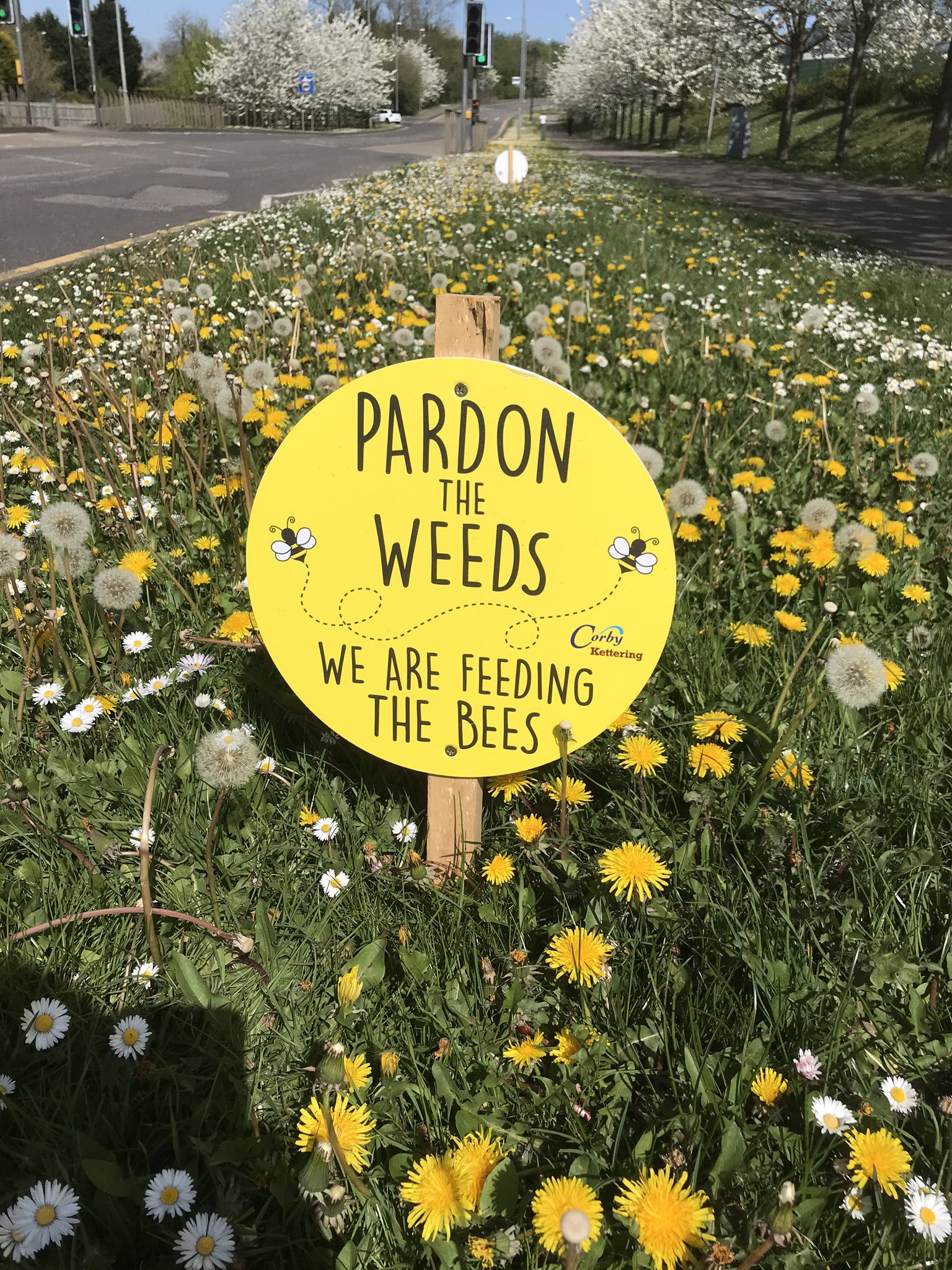
A Chat About The Birds and The Bees
Kettering 'Bee heaven'
A picture of a grass verges abundant with dandelions, long grass, daisies and weeds has been shared around the country after a wildlife fan praised the initiative on social media. Corby and Kettering Councils' joint street scene service decided to let many of its grass verges grow out this year to help increase wildlife in the area.
They have put up signs around the boroughs that say: "Pardon the weeds, we are feeding the bees." A picture of one of the signs surrounded by dandelions near to the industrial area in Burton Latimer was shared by the Twitter account @wild_helper and has since been liked more than 13,000 times and shared 3,000 times. People from around the country have tagged their own councils to ask them to do the same. Dandelions provide an early-Spring food source for pollinators including bees. They provide both pollen and nectar and are vitally important at this time of year when there are not as many other types of flowers yet in bloom. The joint councils' grounds manager Sarah Parr said in reply to the tweet: "I work for Kettering/Corby Borough Council as the Grounds Manager. This tweet today has uplifted our team enormously. "It is part of a larger pollinator project. The team is buzzing today from this. Thank you."
Corby Council lead member for environment Mark Pengelly said: "It's an initiative we took on when we formed our shared service last year. We've rolled it out across both boroughs. The staff have just done an absolutely brilliant job of it. "We're also incredibly proud of the parks and gardens around the two boroughs which are looking superb. We knew they'd really come into their own this summer. It's just a pity there are not more people able to see them at the moment."

Photo by Wolfgang Hasselmann on Unsplash
What the bees mean for us
Here at Shay and Blue we pride ourselves on using real ingredients in our products, these real ingredients are mostly flowers. Bees are our predominant pollinators, pollinating a third of the food we eat and 80% of flowering plants. While there are other methods of pollination, including by the wind, birds, bats and other insects, wild bees are among the most important pollinators because they are capable of pollinating on a much bigger scale.
How you can help bees
Luckily, it’s not too late to help save the bees from extinction. There are lots of things you can do to help protect these important creatures - most of which can be done from the comfort of your own garden.

Photo by Julia Thiemann on Unsplash
Fill your garden with bee-friendly flowers
One of the easiest ways to help out bees is by planting lots of bee-friendly flowers in your garden. Bees favour a wide range of flowering plants, including foxglove, birdsfoot trefoil and red clover, which you can grow easily with our seedball bee mix. Simply scatter the seedballs in a location of your choice and watch them sprout!
Provide shelter for bees
Like most invertebrates, bees need shelter to nest and hibernate in. You can create your own shelter or buy a ready-made bee and insect house – just hang it up in a sunny sheltered spot in your garden and watch bees filling the tubes during the spring and summer months.
Stop using pesticides
Pesticides are one of the key threats to bees, and so one way to help bees is to stop using them in your own garden. Some pests provide food for crucial pollinators, so leaving them to be controlled naturally is the best choice if you want to help save bees.
Help a bee in need
Often during the summer months you may spot a solitary bee sitting unmoving on the ground. Whilst it is easy to presume it might be dead or dying, chances are it is actually exhausted and in need of a quick pick-me-up. You can help out a tired bee by mixing two tablespoons of white, granulated sugar with one tablespoon of water, placing it near the bee so it can help itself to this homemade energy drink.
Bees are crucial to the ecosystem, for both the environment, the flowers we see and for the food we eat. It is estimated that bees pollinate up to 80% of the wild flowers in Europe, our countrysides would be a lot less colourful without them. So the next time you see a bee, before you tell it to buzz off think about if it needs any help. Alternatively you could plant some wild flowers in your garden for it to pollinate!
Like this article? Sign up to our newsletter to get more delivered straight to your inbox
_____________
